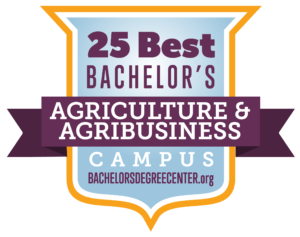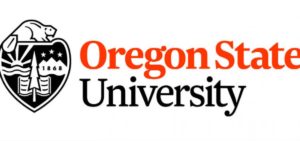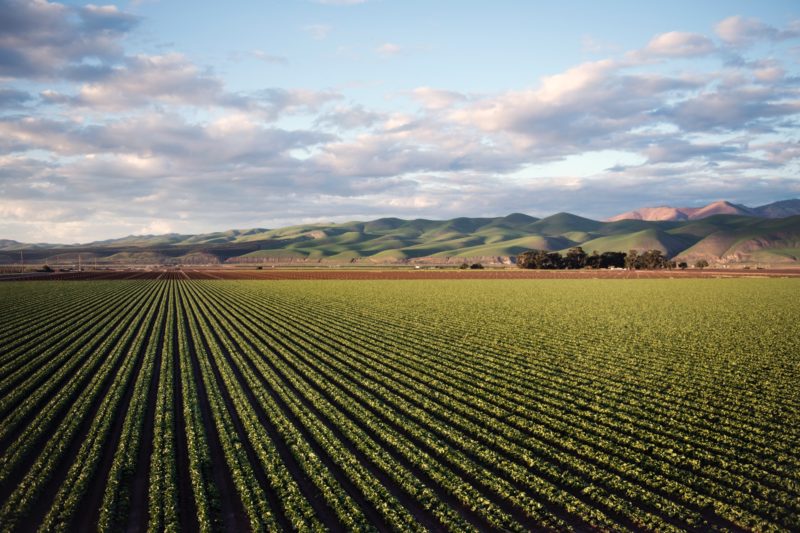
Key Information:
- The University of Illinois’s Agricultural Consumer Environmental Sciences College is the #1 school for an agriculture and agribusiness bachelor’s degree.
- Best agriculture and agribusiness bachelor’s offer a variety of specializations including crop sciences, animal sciences, and environmental sciences.
- Graduates can pursue careers in farming, agricultural science, and agribusiness management.
Once the idea of getting a degree in agriculture would have gotten you laughed out of the tractor supply store, but farming is a lot more sophisticated than it was 50 years ago. Today big pieces of equipment are used, very detailed science is considered, and you need a lot of knowledge, with computers to be successful at farming. For someone who grew up on a farm and has hands-on experience, a degree would help them become an even better farmer. Farming is the main reason people get a degree in agriculture, but there are other reasons to find out what a degree in agriculture is worth.
The key to picking out the right degree is understanding what you really want and understanding the types of agriculture degrees. Agriculture is often associated with farming, but it has many aspects and sub-categories. As to where can I get a degree in agriculture, almost any of the large state universities have degrees in agriculture. The best colleges for agriculture degrees could be debated, but universities in states with a lot of farming should be at or near the top of the list.
Methodology: Ranking the Best Agriculture Degree Programs
For the Bachelor’s Degree Center ranking of the best traditional, on-campus agriculture degrees, editors considered only accredited, reputable colleges and universities. Programs are ranked by practical factors including tuition cost, student satisfaction, and salary potential.
1. University of Illinois at Urbana-Champaign

The University of Illinois’s Agricultural Consumer Environmental Sciences College offers more than a dozen of the best agricultural degrees in Illinois. Students interested in studying for one of Illinois ACE’s best agriculture degrees can select from undergraduate, graduate, and double majors within the college. In addition, the University of Illinois offers online and professional master’s degree programs and study abroad opportunities. Majors include crop sciences, animal sciences, biological engineering, food science, plant biology, and natural resources/environmental sciences, among others.
The University of Illinois (UIUC) was founded as an industrial university in the mid-1860s. UIUC is a land, space, and sea-grant school that serves more than 51,450 students yearly. In addition, the University of Illinois is ranked as a public ivy institution of higher education.
What We Like: The University of Illinois holds the distinction of having the fasting supercomputer on any campus in the nation.
Degree: Multiple Majors
University of Illinois’s Agricultural Consumer Environmental Sciences College
2. Virginia Tech

Virginia Tech’s Agriculture & Life Sciences College offers a variety of Virginia’s best agricultural degrees that are available from the associate to doctoral level. Additionally, V Tech offers students study abroad opportunities while study for Virginia Tech’s best agriculture degrees. Virginia Tech’s Agriculture & Life Sciences College also offers a variety of concentrations for its online master’s degree that includes applied nutrition/physical activity, pest management, plant science, food safety, and biosecurity, environmental science, and leadership studies.
Founded in 1872 as a mechanical/agricultural college, Virginia Tech now operates as a sea, land, & space-grant institution of higher learning with a student body with more than 36,250 graduate & undergraduate students, vying for the more than 250 undergraduate and graduate degree offered.
What We Like: Virginia Tech is recognized to be the 2nd largest, in terms of student enrollment, of any public institution in the Commonwealth of Virginia.
Degree: Multiple Majors
Virginia Tech’s Agriculture & Life Sciences College
3. Texas A&M University-College Station

Texas A&M University’s Agriculture & Life Sciences College offers thirty of the Lone Star State’s best agriculture degrees. The undergraduate best agricultural degrees offered by A&M include the following – agribusiness, agricultural economics, bioenvironmental sciences, food science & technology, plant & environmental science, or bioenvironmental sciences, to name a few. In addition, Texas A&M offers a variety of certificate programs in agriculture, including an online certificate in poultry meat production.
Texas A&M University was founded under the 1862 Morrill Land Grant Act in 1871. The university’s student enrollment nears 70,000 students, which makes it the second largest student enrollment in the country.
What We Like: Texas A&M University holds the distinction of being the first higher learning institution in the Lone Star State and the only university to hold three designations as a land, space, and sea-grant school.
Degree: Multiple Majors
Texas A&M University’s Agriculture & Life Sciences College
4. University of Wisconsin-Madison

The College of Agricultural & Life Sciences at the University of Wisconsin offers a variety of academic degree and certificate programs at the baccalaureate level. The University of Wisconsin’s best agriculture degrees include plat pathology, soil science, forest science, agricultural and applied economics, agronomy, and dairy science, to name a few. In addition, these best agricultural degrees from the University of Wisconsin offer students various international study abroad experiences in the areas of sustainable development, agriculture, and biosciences, among others.
The University of Wisconsin is the official higher learning institution that was established under the Morrill Act in 1848. In addition, this flagship campus of the state’s university system is home to more than 45,450 students.
What We Like: The University of Wisconsin is recognized as a public ivy, with its main campus in the state’s capital on the Lake Mendota shores.
Degree: Multiple Majors
College of Agricultural & Life Sciences at the University of Wisconsin
5. University of Minnesota-Twin Cities

The University of Minnesota’s Food, Agricultural & Natural Resource Sciences College is recognized to offer some of Minnesota’s best agriculture degrees across fourteen majors and more than two dozen minors. Among the best agricultural degrees offered by the University of Minnesota are agricultural education, food science, environmental sciences policies, plat science, and agricultural communication and marketing, to name a few.
The University of Minnesota was established as a land-grant school in 1851 but is now ranked as a public ivy higher Learning institution. The University of Minnesota’s Twin Cities’ campuses are recognized as the oldest in the university system of Minnesota, with a student body of more than 51,50 undergraduate and graduate students.
What We Like: The dual campuses in St Paul and Minneapolis are situated a few miles from each other and offer degrees from the University of Minnesota’s nineteen colleges/schools.
Degree: Multiple Majors
University of Minnesota’s Food, Agricultural & Natural Resource Sciences College
6. University of Maryland-College Park

The University of Maryland’s Agriculture & Natural Resources College offers a variety of the best agriculture degrees and programs of study in the state of Maryland. The available best agricultural degrees options from UM include agricultural and resource economics, international agriculture & natural resources, nutrition & food science, and environmental science & policy, to name a few. In addition, the University of Maryland offers a veterinary medical science and turf grass/golf course management degree option.
The University of Maryland is recognized as a public ivy, with a student enrollment of more than 41,050 undergraduate and graduate students. In addition, the University of Maryland is a land, space, and sea-grant school that is the flagship school of the state’s university system.
What We Like: Established as an agricultural college and was an all-male college until 1916, when the first female students attended classes.
Degree: Multiple Majors
University of Maryland’s Agriculture & Natural Resources College
7. Cal Poly

Cal Poly’s Agriculture, Food & Environmental Sciences College offers some of California’s best agricultural degrees with more than fifteen academic undergraduate majors and another 22 academic minors. Among these best agriculture degrees are unique options like wine & viticulture, crop science, food science & nutrition, bioresource & agricultural engineering, agricultural education & communication, and agribusiness, among others. Cal Poly’s Agriculture, Food & Environmental Sciences College is recognized to be among the five top colleges offering agriculture degrees to Hispanic students.
Cal Poly is one of two polytechnic schools in the Golden State university system that was established in 1901. This space-grant school’s campus in San Luis Obispo is home to more than 22,050 undergraduate and postgraduate students.
What We Like: Cal Poly offers academic programs that combine professional and technical curriculums within the arts/humanities realm.
Degree: Multiple Majors
Cal Poly’s Agriculture, Food & Environmental Sciences College
8. Rutgers, The State University of New Jersey

Rutgers University’s Environmental and Biological Sciences School offers some of the Garden State’s best agricultural degrees through its Agriculture & Food Systems (A&FS) Undergraduate program. Students enrolled in Rutgers University’s best agriculture degrees have the option of tailoring the degree to meet their specific interests and may select from many summer internships at the Rutgers Gardens. The available majors from Rutgers include biotechnology, plant biology, and agriculture, and food systems, plus entrepreneurial agriculture and horticulture therapy programs.
Rutgers University is recognized to be the state university of the Garden State with multiple campuses throughout New Jersey. Founded in 1766, Rutgers is one of the nation’s colonial colleges that is also a land, sea, and space-grant school with more than 68,450 undergraduate and graduate students.
What We Like: Rutgers University is recognized to be a public ivy institution of higher education.
Degree: Agriculture and Food Systems
Rutgers University’s Environmental and Biological Sciences School
9. University of California, Davis

The University of California, Davis’s Agricultural & Environmental Sciences College offers nearly 30 of the Golden State’s best agricultural degrees, including forty additional minors. Among the available best agriculture degrees from UC Davis are animal biology, food science, hydrology, biotechnology, environmental horticulture & urban forestry, atmospheric science, ecological management & restoration, marine & coastal science, or sustainable agriculture and food systems to name a few. The University of California also offers international study opportunities.
The University of California, Davis was established in 1905 as a farm and agriculture school. UC Davis is also a public ivy and is one of ten member schools of the UC system with a student enrollment that nears 40,000 students.
What We Like: The vet school at UC is ranked as the best program in the world and the largest of veterinary school of its kind in the United States.
Degree: Multiple Majors
University of California, Davis’s Agricultural & Environmental Sciences College
10. Cornell University

Cornell University’s Agriculture & Life Sciences College offers a Bachelor of Science in Agricultural Sciences that is recognized as one of the Empire State’s best agricultural degrees. Cornell University’s best agriculture degrees offer degree candidates five academic concentrations that include organic agriculture, sustainable cropping systems, animal science, education & society, and business management & policy, plus the option of double majors. In addition, students enrolled in Cornell University’s agricultural undergraduate degree are required to complete a relevant internship.
Cornell University is a multi-campus school that was established in 1865. This private school is also a sea, space, and land grant institution of higher learning with a student enrollment that exceeds 23,950 students vying for the degrees and certificate programs offered by the school’s fourteen undergraduate and graduate college/schools.
What We Like: Cornell University, as an Ivy League school, has three primary campuses in Ithaca, New York City, and Qatar.
Degree: BS in Agricultural Sciences
Cornell University’s Agriculture & Life Sciences College
11. Ohio State University

The College of Food, Agricultural & Environmental Sciences at Ohio State University offers a variety of Ohio’s best agriculture degrees that include associate and baccalaureate degree programs. The available best agricultural degrees from Ohio State University include options in agribusiness & applied economics, construction systems management, agriscience education, animal sciences, food business management, food science & technology, and plant health management, to name a few.
Ohio State University (OSU) was established under the Morrill Land Grant Act in 1870 and is the state’s flagship institution of higher learning. In addition, this space, sea, and land-grant school operates multiple campuses with a student enrollment of more than 61,150 undergraduate and graduate students.
What We Like: Ohio State University is recognized to be a public ivy school that is ranked among the top public postsecondary schools in the nation, according to US News and World Report.
Degree: Multiple Majors
College of Food, Agricultural & Environmental Sciences at Ohio State University
12. Clemson University

Clemson University’s Department of Agricultural Sciences (CU AS) offers two of South Carolina’s best agriculture degrees with its BS in Agricultural Education or BS degree in Agribusiness. These best agricultural degrees help support one of South Carolina’s leading industries, which impacts the economy with a value worth more than $41 billion. Core coursework for these bachelor’s degree programs includes agriculture & society, the economics of farm management, and quantitative agribusiness analysis. The agricultural education degree offers three emphasis areas – teaching, communications, or leadership.
Clemson University was founded in the late 1880s and now operates as a public space and land-grant institution of higher learning situated near Lake Hartwell, South Carolina. Clemson University’s suburban campus covers more than 1,400 acres and serves about 25,550 undergraduate and graduate students.
What We Like: Clemson is divided into seven colleges/schools which offer programs in business, health/behavioral sciences, agriculture, forestry, architecture, applied sciences, engineering, education, and science.
Degree: BS in Agribusiness or Agricultural Education
Clemson University BS in Agribusiness or Agricultural Education
13. University of Missouri

The University of Missouri’s College of Agriculture, Food & Natural Resources offers more than two dozen of Missouri’s best agricultural degrees, plus a variety of undergraduate-level certificate programs from which to choose. In addition, the University of Missouri’s best agriculture degrees offers degree candidates study abroad programs that help students explore global resources, plus a variety of graduate degree programs for students interested in pursuing a more advanced degree.
The University of Missouri (Mizzou) was established in the late 1830s as the first public higher learning institution to the west of the mighty Mississippi River. The school’s Columbia campus is home to more than 29,850 students who are studying for the more than 290 academic degree programs offered by the school’s thirteen academic divisions.
What We Like: The University of Missouri’s campus is home to several buildings that have been listed as a historic place under a federal government designation.
Degree: Multiple Majors
University of Missouri’s College of Agriculture, Food & Natural Resources
14. Washington State University

Washington State University’s College of Agricultural, Human, & Natural Resource Sciences offers fourteen of Washington state’s best agricultural degrees that cover a wide cross-section of relevant study areas. Among these best agriculture degrees from Washington State University are agricultural biotechnology, agricultural technology & production management, field crop management, organic and sustainable agriculture, food science, agriculture & food security, and agricultural and food business economics, to name a few. Nearly 3,000 undergraduate and graduate students are studying for degree and certificate programs offered by Washington State University’s agricultural college.
Washington State University is a multiple campus institution of higher education that was established as an agricultural college in 1890. In addition, Washington State University maintains multiple campuses in Washington that serve more than 30,450 undergraduate, graduate, and doctoral students.
What We Like: The school is continually developing both a Botanical Garden and Arboretum on a hilltop overlooking the alumni center on the campus.
Degree: Multiple Majors
Washington State University’s College of Agricultural, Human, & Natural Resource Sciences
15. Kansas State University

Kansas State University’s Agriculture College offers some of the best agriculture degrees in the Midwestern United States. These best agricultural degrees from Kansas State University include varying degrees within study areas that include agricultural economics, agricultural education, agribusiness, agricultural technology management, feed science and management, and food science and industry, plus secondary majors that include natural resource & environmental sciences, and global food systems leadership.
Kansas State University (Kansas State) was established under the Morrill Act in the mid-1860s as an agricultural college and holds the distinction of being the first higher learning institution in Kansas. The university is situated in Manhattan and offers its 21,850 students a college-town campus, with historical features that cover more than 500 acres.
What We Like: Kansas State University is organized into nine colleges/schools that offer more than 60 programs in engineering, human ecology, technology, veterinary medicine, business, arts/sciences, and agriculture, among others.
Degree: Multiple Majors
Kansas State University’s Agriculture College
16. University of Nebraska-Lincoln

The Agricultural Sciences & Natural Resources College at the University of Nebraska offers 2.5 dozen degree programs that are ranked among the best agricultural degrees in Nebraska. UNL’s best agriculture degrees include agribusiness, agricultural economics, environmental science, agricultural & environmental sciences communication, and agricultural education, to name a few. Students enrolled in these UNL baccalaureates degrees can participate in the Rural Fellows program offered by Rural Prosperity Nebraska, plus the institute of Agriculture and Natural Resources (IANR).
The University of Nebraska (NU) was established as a land-grant university in the late 1860s and is recognized to be the oldest institution of higher education in Nebraska. Nebraska’s flagship school is home to more than 25,650 undergraduate and graduate students.
What We Like: The school’s football team has sold out every game for the past fifty years, with a stadium that holds more than the population of Bellevue – the state’s 3rd largest city.
Degree: Multiple Majors
Agricultural Sciences & Natural Resources College — University of Nebraska
17. Mississippi State University

Mississippi State University’s College of Agriculture & Life Sciences offers more than a dozen of Mississippi’s best agricultural degrees. Among the best agriculture degrees available from M State are environmental economics & management, food science, nutrition & health promotion, environmental science in agricultural systems, and agricultural science, to name a few. In addition, Mississippi State University offers various scholarships and study abroad opportunities in the summer or spring term.
Mississippi State University (MSU) was founded as a land-grant school in the later 1870s and now operates as a sea and space grant school, with the largest R&D budget of any school in Mississippi. Mississippi State University’s rural campuses serve approximately 22,550 graduate and undergraduate students.
What We Like: Mississippi State University offers the state’s only veterinary medicine and architecture programs.
Degree: Multiple Majors
Mississippi State University’s College of Agriculture & Life Sciences
18. University of Massachusetts-Amherst

The University of Massachusetts’s Stockbridge School of Agriculture, in partnership with the College of Natural Sciences (UMass), offers a variety of both associate and baccalaureate degrees that are available online or on-campus. UMass’s best agricultural degrees that are available online include a BS and an AS in Sustainable Food & Farming. The other best agriculture degrees offered by the University of Massachusetts – Amherst include horticultural science, and plant/soil sciences, and turfgrass science & management.
The University of Massachusetts (UMass Amherst) was founded in 1863 as an agricultural institution of higher education. The Amherst campus of UMass is the largest of the state’s university system and the oldest, with more than 40,150 students attending classes online and, on the school’s, 1,300+ urban campus.
What We Like: The University of Massachusetts @ Amherst is a member of the Five School Consortium, including five institutions of higher education located near each other in Western Massachusetts.
Degree: Multiple Majors
University of Massachusetts’ Stockbridge School of Agriculture
19. Pennsylvania State University

Pennsylvania State University’s College of Agricultural Sciences offers a variety of the best agricultural degrees that can be completed on the university’s campus or through the school’s distance learning platform. PSU offers seventeen of the best agriculture degrees at the undergraduate level that includes agribusiness management, agricultural science, agricultural and extension education, bio-renewable systems, and environmental resource management, to name a few. The Bachelor of Science degree (BS) in Agribusiness Management can be completed 100% online.
Pennsylvania State University (Pennsylvania State) is a state school that was established in 1855 as a high school for farmers. Pennsylvania State University is one of only four schools in the nation with four-designation research consortia that include land, space, sea, and sun grants. In addition, Pennsylvania State University is recognized to be a public ivy with a student enrollment that exceeds 46,550 graduate and undergraduate students.
What We Like: Pennsylvania State University is organized into eighteen colleges/schools.
Degree: Multiple Majors
Pennsylvania State University’s College of Agricultural Sciences
20. Auburn University

Auburn University’s College of Agriculture offers fifteen of Alabama’s best agriculture degrees covering a variety of related study topics. Among Auburn’s best agricultural degrees include agricultural business & economics, Agriculture Science, Agriculture communications, applied biotechnology, agriscience education, biosystems engineering, biological & agricultural technology management, and crop & soil sciences, to name a few. Students enrolled in Auburn University have the option of becoming one of Auburn’s AG Ambassadors.
Auburn University (Auburn) was established as an all-male college in the mid-1850s as a private school but became Alabama’s first land grant school about a decade and one-half later. Auburn University now operates as a space, sea, and land grant school with more than 30,350 students on its 1,800+ acre campus.
What We Like: Auburn University has been ranked among the top 40 public higher learning institutions in the country.
Degree: Multiple Majors
Auburn University’s College of Agriculture
21. University of Arizona

The University of Arizona’s College of Agriculture & Life Sciences offers some of the best agriculture degrees in Arizona, across a variety of relevant study areas. Among the twenty best agricultural degrees from the University of Arizona includes agribusiness economics & management, applied biotechnology, agricultural technology management & education, environmental and water resource economics, sustainable plant systems, biosystems engineering, nutrition & food systems, plant sciences, and natural resources, to name a few.
The University of Arizona (Arizona) is the state’s flagship school that was founded as the first university prior to Arizona reaching statehood. The University of Arizona is a land and space grant school that serves nearly 46,000 students who are vying for degrees offered by UA’s 19 schools/colleges.
What We Like: Students enrolled in the University of Arizona’s programs, and classes hail from every state in the nation.
Degree: Multiple Majors
University of Arizona’s College of Agriculture & Life Sciences
22. Colorado State University

Colorado State University’s College of Agricultural Sciences offers two of Colorado’s best agriculture degrees. These best agricultural degrees from Colorado State University include a bachelor’s degree in agricultural business with two concentrations in farm/ranch management and agricultural economics. In addition, Colorado State University offers a bachelor’s degree in agricultural education with two academic emphases in agricultural literacy and teacher development. It is noted that Colorado State University offers a minor in agricultural business and agricultural literacy.
Colorado State University (CSU) is the flagship school of the state’s university system that was established in 1870 as an agriculture college. In addition to having been established as a land grant institution of higher education, Colorado State University now operates as a space-grant school with a student enrollment of approximately 34,050 students studying online and on-campus.
What We Like: The MBA program offered by Colorado State University is ranked among the ten best in the nation by the Princeton Review.
Degree: Agricultural Business or Education
Colorado State University’s College of Agricultural Sciences
23. University of Vermont

The University of Vermont’s College of Agriculture & Life Sciences offers seventeen of Vermont’s best agriculture degrees, emphasizing agriculture & food systems, life sciences, and the development/preservation of healthful communities. These best agricultural degrees at the baccalaureate level include agroecology, food systems, environmental sciences/studies, biological sciences, international development, animal science, nutrition & food sciences, and dietetics, nutrition, and food sciences, among others.
The University of Vermont (Vermont) was established initially established as a private school in 1791 but a land grant school subsequently. The University of Vermont is recognized as one of the original public ivy schools and one of the oldest universities in the country. The University of Vermont is also a space and sea-grant school with a student enrollment that exceeds 12,550 graduate and undergraduate students.
What We Like: UVM’s hospital on the Burlington campus in Vermont’s largest hospital facility.
Degree: Multiple Majors
University of Vermont’s College of Agriculture & Life Sciences
24. Oregon State University

Oregon State University’s Department of Agricultural Education & Agricultural Sciences offers a Bachelor of Science degree program in Agricultural Sciences that can be completed online or on the La Grande and Corvallis campuses. These best agriculture degrees from Oregon State University offer academic tracks in education, agricultural sciences & natural resources, communications, comparative international, leadership, or a customized option. Students graduating from these best agricultural degrees find a rewarding career as an agricultural teacher, a literacy coordinator, or a crop health technician.
Oregon State University (OSU) is a public university that was founded as a land-grant school in 1868. Additionally, Oregon State University is a sea, sun, and space-grant university, one of only four in the nation with all four designations. More than 26,050 attend classes online and on the school’s college-town campus.
What We Like: nearly ¼ of one million students have graduated from Oregon State University since its inception.
Degree: Agriculture Sciences
Oregon State University’s Department of Agricultural Education & Agricultural Sciences
25. University of Kentucky

The University of Kentucky’s Agriculture, Food & Environment College offers a variety of Kentucky’s best agriculture degrees. The University of Kentucky’s best agricultural degrees include agricultural & medical biotechnology, food science, agricultural economics, sustainable agriculture & community food systems, and agriculture ecosystem sciences, to name a few. The University of Kentucky offers in-state tuition rates for those students from Delaware, Georgia, West Virginia, Tennessee, Louisiana, and Maryland – through the Academic Common Market.
The University of Kentucky (UKY) was founded in 1865 as a land-grant school, one of Kentucky’s two schools established under the Morrill Act. More than 30,450 students attend classes online and the University of Kentucky’s Lexington campus.
What We Like: The University of Kentucky’s campus is home to fifteen libraries.
Degree: Multiple Majors
University of Kentucky’s Agriculture, Food & Environment College
Why Should I Get a Degree in Agriculture
A degree in agriculture is not just valuable on the farm. Beyond arming agriculture is the science of taking care of plants and animals.
Some other jobs that could result from a degree in agriculture:
- Biochemist
- Food scientist
- Environmental engineer
- Combined with a law degree, to be an agriculture lawyer
- Farm veterinarian
- Agricultural engineer
- Agriculture economist
- County extension agent
- Any kind of farm-related sales
Your only limit is your imagination as to what you could do with a degree in agriculture. Still, farming is the main thing. Farmers try to get all they can out of their crops, and most farmers are responsible about the environment. A degree in agriculture brings the latest science and technology to the farm, and many farms are advanced already.
What is Agribusiness?
Agribusiness is basically any business that relates to agriculture, to answer the question of what is the meaning of agribusiness. Farms are most often an agribusiness, but what is the meaning of agribusiness is the larger question. The tractor makes and salesmen are in agribusiness, as are chemists or veterinarians.
Understanding more about agriculture is the starting point to understand what is agribusiness management. Agriculture is the science of helping plants and animals grow and stay healthy. Agriculture is often related to farming, but it involves a lot more than farming. Agribusiness could also be seen as the entire business of farming — from planting to harvesting to distribution.
Agribusiness is the big picture, and there are many pieces to the picture. It is sort of integration of all the steps involved in producing and distributing food. Agribusiness uses sophisticated tools and technology to get the best possible results from what is grown.
Agribusiness is a huge industry but has many aspects. Farms can be a small family operation or a huge operation growing thousands of acres of wheat.
Sometimes agribusiness is associated with huge farms and is seen as the opposite of the small family organic farm. But even a small operation needs a business plan, and that is what agribusiness is about.
How Do I Choose the Right Agriculture Degree?
There are levels of degrees. You can get a certificate in a certain area of agriculture from a junior college that will take a year or two. Many four-year schools have this as well. Beyond that is a BS or BA, which is a basic four-year college education. Master’s degrees are available in one of the aspects of agriculture, and you can get a Ph.D. in agriculture.
Associate degrees or certificates focus more on farming techniques. Some classes may involve.
- Marketing
- Soil management
- Crop science
- Livestock management
- Sustainability
- Agricultural production
- agriculture industry
A Bachelors’s degree is more involved with management, and with many more areas of agriculture than just farming. Some emphasize the business side, while others emphasize the management of farming operations.
Some classes could involve:
- Microeconomics
- Livestock management
- Food and marketing
- Research and statistics
Master’s degrees are for those that want to get into management or teaching agriculture. There is also more of a focus on a specific area, and there may be an internship.
Some classes you might take include:
- Agriculture leadership
- Agriculture technology
- Education techniques
Ph.D. degrees are for people wanting to take high-level positions in agricultural businesses or international studies. They also prepare and qualify a person to teach at the college level.
Some classes involve
- Demand and production
- Agriculture marketing theory
- Strategic management
- Market theory
There are many more career paths in agriculture than most people realize, as the Bureau of Labor Statistics shows. Food production, livestock production, crop production, and other kinds of farm products are key to the economy. Agriculture students can use their agriculture courses to choose a specialization, increasing their career options.
Related Rankings:
15 Best Online Bachelor’s in Agriculture and Agribusiness
10 Fastest Online Bachelor’s in Agriculture and Agribusiness
10 Most Affordable Bachelor’s in Agriculture and Agribusiness
